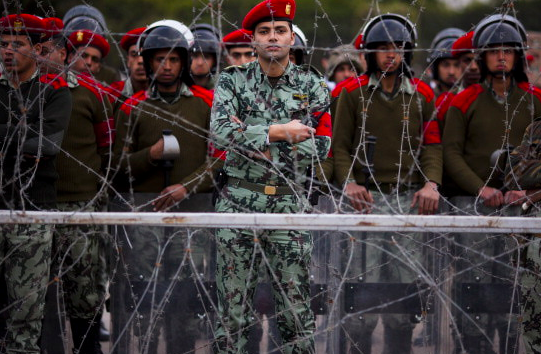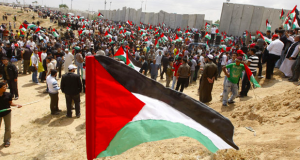
The Egyptian army may have broken international law by forcibly evicting more than 3,000 families in the Rafah area, Human Rights Watch (HRW) reports. The 84-page report, “Look for Another Homeland,” documents the Egyptian government’s failure to provide adequately for residents during and after evictions in North Sinai. “Since July 2013, ostensibly to eliminate the threat of smuggling tunnels, the military has arbitrarily razed thousands of homes in a once-populated buffer zone on the border with the Gaza Strip, destroying entire neighborhoods and hundreds of hectares of farmland,” the rights group said. “Destroying homes, neighborhoods, and livelihoods is a textbook example of how to lose a counterinsurgency campaign,” said Sarah Leah Whitson, Middle East and North Africa director. “Egypt needs to explain why it didn’t use available technology to detect and destroy the tunnels and instead wiped entire neighborhoods off the map,” she added. “The Egyptian authorities provided residents with little or no warning of the evictions, no temporary housing, mostly inadequate compensation for their destroyed homes – none at all for their farmland – and no effective way to challenge their eviction, home demolition, or compensation. These actions violated protections for forcibly evicted residents that are laid out in United Nations and African conventions to which Egypt is a party, and may also have violated the laws of war,” the group revealed.
“Between July 2013 and August 2015, Egyptian authorities demolished at least 3,255 residential, commercial, administrative, and community buildings in the Sinai Peninsula along the border with the Gaza Strip, forcibly evicting thousands of people. Extended families who had lived side by side for decades found themselves dispersed, forced to abandon the multi-story houses they had built next to their relatives and passed down through generations. Some families became homeless and lived in tents or sheds on open land or in informal settlements. The Egyptian authorities razed around 685 hectares of cultivated farmland, depriving families of food and livelihood and stripping most of the border of its traditional olive, date and citrus groves. The evictions scattered families among the Sinai’s towns and villages and in some cases as far as Cairo and the Nile Delta. The Egyptian government has indicated that these evictions could continue,” the report said.
The so-called “war on terror” in Sinai heavily affects Gaza as well since the Egyptian border is the only exit for many Gazans. Since Israel forbids certain goods from entering Gaza, residents of the Sinai Peninsula and the Gaza Strip often trade through tunnels. While Egypt has destroyed most of the larger tunnels once used to smuggle cars and trucks, hundreds of smaller tunnels have evaded detection and their owners say they engaged in lucrative business transactions during the Israel-Gaza conflict of 2014. Under the terms of Egypt’s 1979 peace accord with Israel, the Sinai is largely demilitarized. Egypt has started flooding the tunnels using water from the Mediterranean Sea. Claiming that the tunnels are being used for militant activities, Egypt’s military laid enormous pipes to flood tunnels with water after pumping water from the Mediterranean into reservoirs. The mechanism will result in inundating the tunnels with water without having to find their exact location, an anonymous Palestinian source told Anadolu Agency.
Families living near Egypt’s border with the Gaza Strip have begun emptying their homes due to clashes between security forces and Ansar Bayt al-Maqdis – an al-Qaida-inspired terror group that has allegedly declared allegiance to ISIS. The group is targeting police forces and soldiers on the Sinai Peninsula, a strategically important area that borders Israel, Gaza and the Suez Canal, the fastest shipping route between Europe and Asia. In April, Reuters news agency reported that in the village of Ibshar and eight other villages along the frontier, 680 houses were being razed to seal off smugglers’ tunnels with the hope of crushing a militant insurgency in the northern Sinai. It is claimed that Ansar Bayt al-Maqdis has launched a beheading campaign against local residents who inform security forces about their upcoming attacks and the location of their militants.
The Egyptian army has been pounding militants but has avoided launching a ground attack due to geographic difficulties and the fact that the militants cannot be distinguished from common residents. A source from the Egyptian security forces told Reuters that “the army’s biggest problem is that the militants are part of the civilian population. You need to pick them out with a pin.” Reuters reported that some residents say the new measures amount to collective punishment that will do little to rebuild loyalty to a central government that has long neglected them. “I am not leaving my house even if they kill me. I was born and raised in this house,” said one woman sitting outside her home in Ibshar. “If they want the terrorists, they know where they are. There’s no need to force us from our homes.”
A night-time curfew is in force in northern Sinai but the streets are deserted by mid-afternoon. Internet and phone lines are disconnected for an average of 16 hours a day according to residents and checkpoints dot the main roads. The Bedouin clans that form most of the region’s population have long complained of the lack of jobs and opportunities that they say drives many locals into the tunnel smuggling trade.
The recent terror attack prompted Egyptian authorities to redouble their efforts to find and shut the tunnels. However, these efforts hurt the economic situation of the local people who are troubled with poverty due to the lack of job opportunities and investment. Egypt has offered compensation to residents who leave their homes, handing out $125 to cover three months of temporary accommodation. More than 200 houses were bulldozed or demolished in the plan’s first few days – revealing no less than 117 passages, an officer told Reuters. However, the residents seem quite disappointed with the central government’s policy toward the region.
Since the incumbent President Abdel-Fattah el-Sissi took the power after ousting Egypt’s first democratically elected president, Mohammed Morsi, the country has been dragged into chaos. After Sissi took power, the international community voiced its concernment about human rights violations committed by Sissi, such as mass death sentences, arbitrary detentions and the suppression of all opposition groups.”

